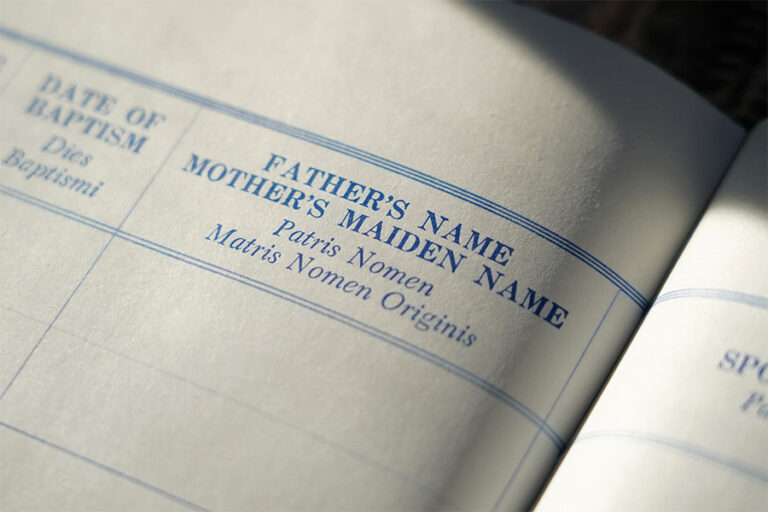A mother’s maiden name refers to the surname a woman had before she got married.
Importance Of Mother’s Maiden Name In Identity Verification
The mother’s maiden name plays a crucial role in identity verification and establishing a person’s identity. It is commonly used as a security measure by banks, financial institutions, and other organizations to verify a person’s identity and protect against identity theft and fraud.
Utilizing the mother’s maiden name as a security question adds an extra layer of protection. It is a piece of personal information that is not easily accessible to others, making it difficult for potential imposters to gain unauthorized access to sensitive information.
By requiring individuals to provide their mother’s maiden name, organizations can verify their identity more accurately. This information helps to prevent unauthorized access to accounts, sensitive data, and personal information. It acts as a unique identifier that only the individual and their trusted organization should know.
Overall, the mother’s maiden name serves as an important tool in identity verification and security, enhancing the protection of individuals’ personal information and preventing fraudulent activities.
Historical Origins Of Mother’s Maiden Name
The term “Mother’s Maiden Name” refers to a woman’s surname prior to marriage. It is a widely used security question in various systems to verify one’s identity or access personal information. The historical origins of this practice date back centuries. During the medieval period, when surnames were introduced, the father’s name became the default surname for the child. However, ancestral ties and lineage were \ of significant importance, and the mother’s maiden name helped establish a family’s bloodline. This tradition also served as a means of identification, particularly in rural communities where individuals were more easily recognized by their mother’s family names.
Cultural and societal factors have contributed to the persistence of this tradition. In many cultures, a woman’s maiden name signifies her family’s heritage and allows for connections to be made with ancestors. Furthermore, in societies where women change their surnames upon marriage, retaining the mother’s maiden name can prevent confusion in genealogical records. Additionally, this practice empowers women to preserve their personal identity and professional reputation. Overall, the use of a mother’s maiden name as a verification method is deeply rooted in historical and cultural significance.
Evolution Of Mother’s Maiden Name In Modern Society
The concept of a mother’s maiden name has undergone significant evolution in modern society. With changing attitudes towards gender roles and family dynamics, the use of a mother’s maiden name has taken on new meaning and importance.
One major factor that has influenced the changing attitudes towards mother’s maiden names is the women’s rights movement. As women have fought for equal rights and recognition, the use of their maiden names has become a symbol of independence and identity. It allows women to maintain a connection to their own family history and lineage, even after marriage.
Additionally, societal attitudes towards marriage and gender roles have also played a role in the acceptance of mother’s maiden names. Many couples now prioritize equality and fairness in their relationships, leading to a greater acceptance of women choosing to retain their maiden names.
This shift in attitudes is reflected in various aspects of society, including legal documents, personal identification, and social customs. It is not uncommon to see women using their mother’s maiden name as a hyphenated or dual last name, or even choosing to solely use their maiden name.
The evolution of mother’s maiden names in modern society is a testament to the changing dynamics of gender and marriage. It represents a step towards greater equality and recognition of women’s individual identities and choices.
Common Applications Of Mother’s Maiden Name
The mother’s maiden name is commonly used in various applications, particularly in legal documents and official records. Its primary purpose is to provide an additional layer of security and verification when dealing with sensitive information.
In legal documents, the mother’s maiden name is often required for identification and authentication purposes. It helps to establish a person’s true identity, especially in cases such as applying for a passport, driver’s license, or social security benefits.
Additionally, the mother’s maiden name may be incorporated into official records such as birth certificates and marriage licenses. This inclusion serves as a means of cross-referencing information and helps prevent instances of identity theft or unauthorized access to personal records.
| Legal Document | Purpose |
|---|---|
| Passport Application | Identification and verification |
| Driver’s License Application | Proof of identity |
| Social Security Benefits Application | Protect against fraud |
By incorporating the mother’s maiden name into official documents and legal procedures, individuals can help safeguard their personal information and prevent unauthorized access to sensitive data. It’s a crucial aspect of identification and adds an extra layer of security in various important applications.
Privacy And Security Concerns Surrounding Mother’s Maiden Name
Privacy and Security Concerns Surrounding Mother’s Maiden Name
Disclosing a person’s mother’s maiden name can pose significant privacy and security risks. This information is commonly used as a security question or identifier by financial institutions and online accounts. Therefore, if someone gains access to this information, it increases the likelihood of unauthorized access to sensitive data.
There are several potential risks associated with sharing one’s mother’s maiden name:
| Risk | Description |
| Identity theft | Knowing a person’s mother’s maiden name allows malicious individuals to impersonate them and gain access to personal information or accounts. |
| Phishing attacks | Criminals may use this information to craft convincing emails or messages aimed at tricking individuals into providing sensitive information. |
| Social engineering | Using knowledge of a person’s mother’s maiden name, fraudsters can manipulate individuals into revealing additional personal details. |
| Account takeover | If cybercriminals have access to a person’s mother’s maiden name, they can potentially reset passwords or bypass security measures. |
To protect against such risks, individuals can take the following safeguards:
- Avoid sharing your mother’s maiden name on social media or any publicly accessible platform.
- Choose security questions that are not related to this information or use two-factor authentication.
- Regularly monitor financial statements and credit reports for any suspicious activity.
- Use strong, unique passwords for online accounts and consider using a password manager.
- Stay vigilant against phishing attempts and verify the legitimacy of any requests for personal information.
Alternatives To Mother’s Maiden Name For Identity Verification
The definition of mother’s maiden name is the surname that a woman had before marriage. However, the use of mother’s maiden name as an identity verification method has its limitations and risks. That’s why there are alternatives to using this information for identity verification purposes.
One alternative is the use of biometric technologies. Biometrics involves the measurement and analysis of unique physical or behavioral characteristics. By utilizing fingerprints, facial recognition, iris scans, or voice recognition, individuals can be identified with a higher level of accuracy compared to relying solely on a person’s maiden name.
Another alternative is the adoption of unique identifiers in place of mother’s maiden names. These identifiers can be in the form of a unique identification number or a specific code linked to an individual’s identity. This approach eliminates the need for relying on personal information that can be easily obtained or manipulated.
By exploring alternatives to mother’s maiden name, identity verification can become more robust and secure. Whether it’s leveraging biometric technologies or implementing unique identifiers, these methods offer enhanced protection against identity theft and fraud.
Cultural Variations In Utilizing Mother’s Maiden Name
The use of mother’s maiden name in different cultures varies greatly. Naming traditions differ across countries, showcasing unique practices and customs. For instance, in some countries, it is common for women to retain their maiden names even after marriage, while in others, they adopt their husband’s surname. In certain cultures, the use of maternal surnames has historical significance and is a way to preserve family lineage. On the contrary, some societies prioritize the importance of the paternal surname and consider it essential for maintaining family identity. These cultural variations reflect the deeply-rooted beliefs and traditions of each society. It is fascinating to observe and explore these differences in the utilization of mother’s maiden names and how they shape individual and collective identities.
The Future Of Mother’s Maiden Name
As society continues to evolve, the question of the relevance of a mother’s maiden name becomes increasingly important. With changes in gender roles, family structures, and cultural norms, predictions and speculations arise regarding the future of this traditional practice.
One possible change is the adoption of hyphenated surnames, where both the maternal and paternal surnames are combined. This allows for the preservation of both family names and can be seen as a symbol of equality within the family unit.
Another potential adaptation is the emergence of alternative naming practices. Some individuals may choose to take on their mother’s surname as a way to honor their maternal lineage or challenge traditional patriarchal norms.
| Predictions and Speculations: | Possible Changes and Adaptations: |
|---|---|
| – Increased use of hyphenated surnames | – Adoption of alternative naming practices |
| – Symbolic representation of gender equality | – Honor and recognition of maternal lineage |
| – Challenging traditional patriarchal norms | – Breaking away from societal expectations |
While it is impossible to predict the exact future of the mother’s maiden name, these possibilities indicate a shifting perspective on the importance of preserving and honoring maternal heritage. Whether through the use of hyphenated surnames or the adoption of alternative naming practices, society is actively redefining the significance of family names.

Credit: www.collinsdictionary.com
Frequently Asked Questions On Definition Of Mother’s Maiden Name
What Is A Mother’s Maiden Name?
A mother’s maiden name refers to the last name a woman had before she got married. It is her surname at birth or the surname of her mother before marriage. It is commonly used as a security question to verify identity and protect against fraud.
Why Is A Mother’s Maiden Name Important?
A mother’s maiden name is important for security purposes, especially when verifying identity over the phone or online. It serves as an additional layer of protection to prevent unauthorized access to personal information or accounts. It is a common security question used by banks, credit card companies, and other institutions.
Can A Mother’s Maiden Name Be Changed?
Yes, a mother’s maiden name can be changed through a legal process such as marriage or adoption. When a woman gets married, she may choose to change her last name to her spouse’s last name. In adoption cases, the child’s last name may be changed to the adoptive parent’s last name, resulting in a change in the mother’s maiden name.
How Is A Mother’s Maiden Name Used For Security?
A mother’s maiden name is used as a security question to help verify identity, particularly for accessing sensitive information or making transactions online or over the phone. It adds an extra layer of protection by requiring knowledge of a personal detail that is not easily obtainable or known to others.
Conclusion
In a nutshell, the mother’s maiden name refers to the surname a woman carries before getting married or changing her name. It serves as a security measure for identification purposes in various sectors, particularly in banking and online transactions. Understanding the significance of one’s mother’s maiden name helps ensure personal security and the prevention of identity theft.
By safeguarding this information, individuals can protect their identities and maintain a sense of privacy in the digital era.







